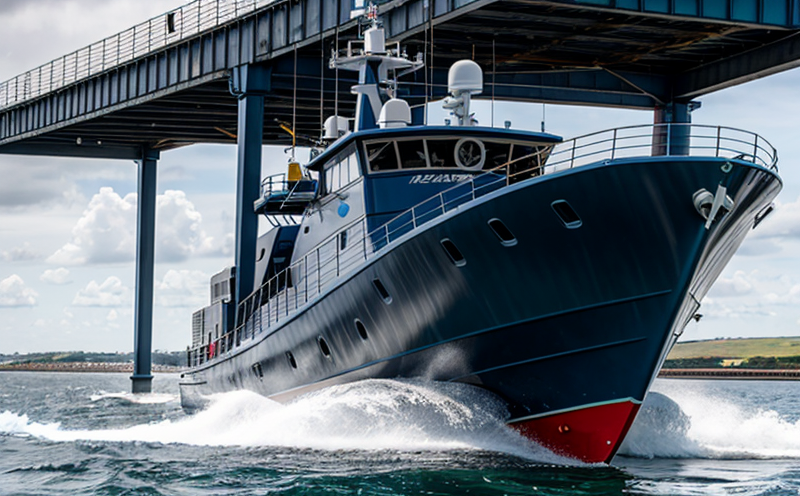ISO 15557 Engine Fuel System Verification Testing
The ISO 15557 standard for engine fuel system verification testing establishes a robust framework to ensure the reliability, safety, and performance of marine engine fuel systems. This service ensures that manufacturers can demonstrate compliance with international standards, thus protecting end-users from potential hazards such as fuel leaks or improper fuel flow.
The testing process involves several critical steps aimed at evaluating various aspects of the fuel system. These include pressure testing to ensure integrity, leak detection under simulated operating conditions, and verification of fuel delivery rates within specified tolerances. The marine sector demands high reliability due to the harsh operational environments, and this service plays a crucial role in meeting these stringent requirements.
Engine fuel systems are intricate components that must function flawlessly under extreme conditions. During testing, we simulate real-world scenarios such as cold starts, peak loads, and sudden changes in operating conditions. This comprehensive approach allows us to identify any potential weaknesses or areas for improvement before the product reaches the market.
The service also involves thorough documentation of test results, which are aligned with international standards like ISO 15557:2013. These reports serve as a valuable resource for quality managers and compliance officers, ensuring that all stakeholders can verify adherence to regulatory requirements.
For R&D engineers, this testing service offers insights into the performance characteristics of new designs. By identifying any discrepancies early in the development cycle, they can refine their prototypes more efficiently, leading to faster product launches and reduced time-to-market. Additionally, procurement teams benefit from this service as it ensures that suppliers deliver components that meet the highest quality standards.
The ISO 15557 standard emphasizes the importance of testing fuel systems under realistic operating conditions. This holistic approach not only enhances safety but also contributes to environmental sustainability by reducing fuel waste and minimizing emissions. By ensuring that engines operate efficiently, we help mitigate the carbon footprint associated with marine operations.
Our team of experts uses advanced instrumentation and sophisticated software to conduct these tests accurately and consistently. The use of state-of-the-art equipment ensures precise measurements and reliable data collection, which are essential for meeting stringent industry standards.
In summary, ISO 15557 engine fuel system verification testing is a vital service that guarantees the safety, reliability, and performance of marine engines. By adhering to this standard, manufacturers can build trust with their customers while complying with global regulations.
Benefits
Adhering to ISO 15557 ensures that engine fuel systems meet the highest international standards, offering numerous benefits:
- Enhanced Safety: Rigorous testing reduces the risk of accidents caused by fuel leaks or improper fuel flow.
- Regulatory Compliance: Demonstrates adherence to global regulations and industry best practices.
- Improved Efficiency: Identifies inefficiencies early in the design process, leading to optimized performance.
- Increased Customer Trust: By meeting stringent standards, manufacturers build a reputation for reliability and quality.
- Competitive Edge: Demonstrates commitment to excellence, setting you apart from competitors.
- Sustainability: Efficient fuel systems contribute to reduced emissions and lower operating costs.
These benefits collectively enhance the overall value proposition of your products in the marine sector.
Environmental and Sustainability Contributions
The ISO 15557 standard plays a crucial role in promoting environmental sustainability within the marine industry. By ensuring that fuel systems operate efficiently, we help reduce emissions and minimize waste. This is particularly important given the increasing focus on reducing the carbon footprint associated with maritime operations.
Efficient engines consume less fuel, which directly translates to lower greenhouse gas emissions. Additionally, by preventing leaks and ensuring proper fuel flow, ISO 15557 helps conserve resources and reduce operational costs for ship operators. This not only benefits the environment but also contributes to long-term cost savings for businesses operating in this sector.
The standard’s emphasis on real-world testing conditions ensures that engines are optimized for performance under various environmental factors. This approach fosters innovation in sustainable practices, encouraging manufacturers to explore new technologies and materials that further enhance efficiency and reduce impact.
In summary, ISO 15557 engine fuel system verification testing is not just about compliance; it’s also about contributing positively to the environment and promoting sustainability within the industry.
Competitive Advantage and Market Impact
The implementation of ISO 15557 engine fuel system verification testing provides significant competitive advantages that can impact market positioning:
- Innovation Leadership: By staying ahead of regulatory requirements, you demonstrate your commitment to continuous improvement.
- Better Product Quality: Rigorous testing ensures superior product quality, enhancing customer satisfaction and loyalty.
- Cost Efficiency: Early detection of inefficiencies reduces development costs and time-to-market.
- Differentiation in the Market: Meeting stringent international standards sets your products apart from competitors.
- Better Customer Relationships: Compliance with global regulations fosters trust and strengthens customer relationships.
These advantages contribute to a stronger market presence, positioning you as a leader in the marine industry. By adhering to ISO 15557 standards, you not only meet regulatory requirements but also ensure that your products are fit for purpose, enhancing their overall value proposition.





